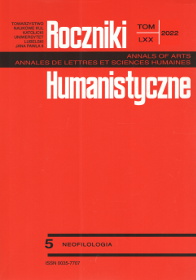Entre illusion et réalité : le corps dans « Le Jeûne » et « La Mort d’un paysan » d’Émile Zola
Between Illusion and Reality: The Body in “Le Jeûne” and “La Mort d’un paysan” by Émile Zola
Author(s): Warren JohnsonSubject(s): Language and Literature Studies, Studies of Literature, French Literature
Published by: Towarzystwo Naukowe KUL & Katolicki Uniwersytet Lubelski Jana Pawła II
Keywords: Zola; Le Nouveau Décaméron; body; illusion; reality; idealism
Summary/Abstract: This article studies the two tales conributed by Émile Zola to Le Nouveau Décaméron, the collective enterprise of Catulle Mendès. These contributions, “Le Jeûne” and “La Mort d’un paysan”, form two parts of the same questioning of the relationship between the material and the spiritual, and between the physical reality of the body and the mind. For the selfish and frivolous Baroness in “Le Jeûne,” the eloquence of the vicar combined with the warmth in the church give her a sensual pleasure that goes against the warnings of the priest. In contrast, “La Mort d’un paysan” presents a positive perspective on rural life regulated by natural rhythms and family solidarity, where death is accepted as a part of life, but illusion is banished. These two texts allow Zola to attack, from opposite directions, a false and unproductive idealism.
Journal: Roczniki Humanistyczne
- Issue Year: 70/2022
- Issue No: 5
- Page Range: 51-61
- Page Count: 11
- Language: French

